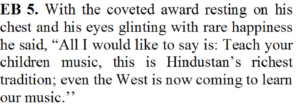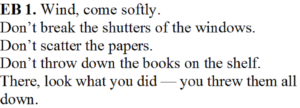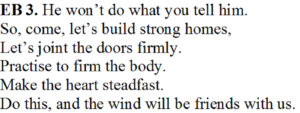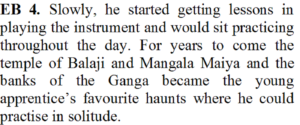English CBSE Class 9 NCERT Beehive Chapter 2 The Sound of Music Free Solution of Extra Questions and Answers – Extract Based Questions Short Answer Questions Long Answer Questions and Value Based Questions
THE SOUND OF MUSIC
Part I
Evelyn Glennie Listens to Sound without Hearing It
(Extra Questions)
Extract Based Questions


(i) Who is referred as ‘she’ in the above extract?
(ii) Where was ‘she’ going?
(iii) Which word in the extract mean ‘push’?
(iv) What was approximate age of the girl?


(i) To whom does the word ‘she’ refer to?
(ii) Why was her name called?
(iii) How is speaker of the above extract related to ‘she’?
(iv) Which word in the extract is synonym of ‘understood’?


(i) Who is speaker of the above extract?
(ii) To whom the above extract is spoken to?
(iii) How did listener feel the vibration of drums?
(iv) Why ‘he’ advise not to listen through your ears?


(i) What are other two names for United Kingdom?
(ii) At what age ‘she’ decided to make music her life?
(iii) What event is referred to as ‘that point’ in above extract?
(iv) Which word in the extract is synonym of ‘travelled’?


(i) Who is referred as ‘she’ in above extract?
(ii) Why men with busy beards gives her trouble?
(iii) Aprt from English, which other two languages ‘she’ knew?
(iv) Which word in the extract mean ‘accent’?


(i) Who is referred as ‘he’ in above extract?
(ii) According to extract what can ‘she’ feel?
(iii) What cab ‘she’ express music so beautifully?
(iv) Which word in the extract mean ‘unusual’?


(i) From which chapter this extract has been taken?
(ii) Who is author of the lesson from which above extract has been taken?
(iii) Who derive inspiration from ‘her’?
(iv) Which phrase in the extract mean ‘physically challenged’?


(i) Who is being referred to as an ‘aspiring musician’ in above extract?
(ii) What was the bigger challenge for ‘her’ than most?
(iii) What does the phrase ‘Scottish farm’ mean?
(iv) What word in the extract is synonym of ‘reputed’?


(i) What was the advice of specialist?
(ii) At what age she was taken to a specialist?
(iii) Why do you think her marks deteriorated?
(iv) Which word in the extract is antonym of ‘increased’?
Short Answer Questions (30-40 words)


Answer: She wanted to travel to Royal Academy of Music in London. To catch train to go there, she had gone to underground railway station.
She was deaf thus was not sure about her admission to the Institute. Hence she was nervous.


Answer: Evelyn was waiting for her turn to play piano. Her name was called out but she did not move. This was the first sign of deafness.
On the advice of headmistress of her school, Evelyn’s parents took her to a doctor who confirmed about her deafness.


Answer: The doctor informed them that Evelyn’s hearing was severely impaired due to nerve damage. The doctor advised that Evelyn would have to use hearing aid. He further advised that Evelyn should be sent to a school that was for deaf people.


Answer: Even after listening to advice of doctor Evelyn did not lose heart. She was determined to lead life of normal people and pursue her interest in music.


Answer: Ron Forbes advised and motivated her during her initial journey of music.
He tuned two drums to different notes. He advised Evelyn not to hear the sound through her ears. He advised her to feel the sound and vibrations through some other means.


Answer: Evelyn had gradually picked up the art of lip reading. Expression on the face and in the eyes also helped her.
It was difficult for her to do lip reading if people had thick bushy beard. So she was not able to understand their communication.


Answer: She did not accept any hint about her heroic achievement. She used to perform in prisons and hospitals without any charge. She gave importance to teaching music to children.
Thus we infer that she always remained humble.


Answer: Evelyn was almost completely deaf. But she pursued music to become one of the most popular musician of her era.
Every handicapped person started thinking – “If she could do it, I too can do it”.
Thus she was an inspiration to many.


Answer: She understood sound and vibrations of music through various parts of her body. She could feel through parts of body above her waist and below her waist. She felt through her shin, cheekbones, hair, fingertips and through her legs.
Long Answer questions (120-150 words)


Answer: At the age of 11 she was diagnosed with almost complete deafness. Putting up hearing aids did not help her much.
She was not ready to give up. She decided to play xylophone. A percussionist Ron Forbes noted her potential. He tuned two drums to different notes. He advised her not to hear sound through her ears. He asked her to feel the sound and vibrations through some other means. Soon Evelyn realised that she could feel sound of one drum through her body above waist and that of other drum through her body below her waist.
Soon she started feeling sound and vibrations through her skin, cheek bones and even through her air. While playing xylophone she could feel vibrations through her fingertips. She would sit on wooden platform bare feet to feel sound through her legs.
Thus she felt music and vibrations through various parts of her body.


Answer: After she was diagnosed with hearing loss, Evelyn did not give up. She decided to play xylophone to pursue her interest in music. She started practising a lot. Soon a percussionist Ron Forbes recognised her potential.
Ron advised Evelyn to feel sound and vibrations of music through some other means. Soon Evelyn realised that she could feel music through her skin, hair, cheekbones, fingertips and legs. She used to practice for many hours every day.
She took admission into Royal Academy of Music in London. She scored one of the highest marks in the history of the Academy during her audition. During three year course there she had won almost every top award.
Initially she participated as a member of orchestra. Later she moved to solo performances. Soon she became one of the most popular musician in the world of her era.
Thus through her hard work Evelyn achieved glory.


Answer: Evelyn was one of the most popular musician of her era. She had graduated from being member of orchestra to a solo performer.
In addition to her regular stage performances she regularly performed in prisons. She did not charge any fee for such performances.
Yet another place where she performed regularly was hospitals. She did not charge any fee for such performances.
She was one of the most sought after multi-percussionist with mastery over thousands of instruments. But she never accepted any hint about her heroic achievements.
She gave a high priority to teaching music to children.
We can thus infer that she remained humble in spite of being a great musician.
****
Part II
The Shehnai of Bismillah Khan
(Explanation)
Extract Based Questions


(i) To what does the word ‘it’ refer to in the above extract?
(ii) Who had banned playing of pungi?
(iii) What was the new name given to improvised pungi?
(iv) Which word in the extract is antonym of ‘amateur’?


(i) What does the word ‘it’ refer to in above extract?
(ii) What was the name of earlier version of ‘it’?
(iii) What was profession of the person who had invented ‘it’?
(iv) Which word in the extract is synonym of ‘part’?


(i) What is the name of the boy referred to in above extract?
(ii) Which instrument was played by the ‘boy’?
(iii) From whom did the boy receive coaching?
(ii) To what does the word ‘instrument’ refer to in above extract?
(iii) Who accompanied ‘he’ while practicing?
(iv) Which word in the extract is synonym of ‘trainee’?


(i) Who is speaker of the above extract?
(ii) Which award is being referred to in above extract?
(iii) What according to above extract is the richest tradition of India?
(iv) Which word in the extract mean ‘shining’?


(i) Please write name of ‘he’ referred in above extract?
(ii) Which was the first foreign country ‘he’ had visited?
(iii) What was the profession of ‘Khansaab’?
(iv) Which word in the extract is synonym of ‘affectionately’?


(i) Who is referred to as ‘he’ in above extract?
(ii) On which date the programme referred in the extract was organised?
(iii) Which instrument ‘he’ played on the day referred by the extract?
(iv) Which word in the extract is synonym to ‘afterwards’?
Short Answer Questions (30-40 words)


Answer: A barber had improved tonal quality of pungi.
It was first played in the Shah’s chambers. It was played by a nai (barber). Therefore the instrument was named the ‘shehnai’.


Answer: Ustaad Bismillah Khan is given the credit for bringing shehnai to classical stage.
Earlier it was played in courts of kings as an essential part of ensemble of nine musical instruments. It was also played at temples and during wedding.


Answer: The Maharaja of Dumraon used to give prize of laddu weighing 1.25 kg to Bismillah Khan.
He used to give this prize for singing Bhojpuri Chaita.


Answer: Once he went to his maternal uncle Ali Bux who was a shehnai player. He was fascinated watching his uncle playing shehnai. He used to accompany him to the temple where his uncle used to play shehnai.
Thus Bismilah Kan got attracted to shehnai.


Answer: Bismillah khan used to practice at temple of Balaji and Mangala Maiya. He also used to do practice at the banks of Gnaga in Benaras.
These were his favourite spots because he could practice there alone.


Answer: The shehnai continues to be played in temples. It is also an indispensable part of traditional North Indian wedding.
Thus we can conclude that shehnai is considered auspicious.
Long Answer questions (120-150 words)


Answer: Even after partition, Bismillah Khan did not move to Pakistan. He had gone there only once for the sake of going. He was there only for about an hour. He said namaskar to people of Pakistan and salaam alaikum to people of India cams and came back to India.
He refused to shift to USA to head a shehnai school. He had said that though temples of Benars could be recreated in USA but it was not possible to transport river Ganga there.
In spite of having travelled across the globe, he continued to consider Benaras and Dumraon as the most beautiful towns in the world. He had once said “Whenever I am in foreign country, I keep yearning for Hindustan”.
Thus we can infer that Bismillah Khna loved India the most.


Answer: As a child Bismillah Khan was as playful as any other child would be. He played gilli danda. He sang at the temple of Bihariji at Dumraon to obtain the gift of 1.25 Kg laddu.
He was a good observer. He intently listened to the music played by his maternal uncle Ali Bux. He accompanied his uncle to Vishnu temple at Benaras. He would sit there to listen to music played by his uncle.
He worked very hard. He used to practise for long hours at temples of Balaji and Mangala Maiya. He would go to banks of river Ganga to practice alone for long duration.
He was quite creative. He improvised and invented various ragas that were thought to be impossible to play on shehnai.
He was a patriot. In spite of travelling across the globe he yearned to be in India. He had refused to head a shehnai school in USA.
Thus Bismillah Khan was a hardworking, creative and patriotic personality.
****
WIND
(Extra Questions)
Extract Based Questions


(i) In last line of the extract what is the complaint of poet?
(ii) Has wind been portrayed as powerful or as a week?
(iii) What is the poetic device used in second line of the extract?
(iv) Which word in the extract mean ‘spread’?
(v) What request is made by poet to wind?
(vi) In the last line of extract, to what does the word ‘them’ refer to?


(i) To whom does the word ‘you’ refer to in above extract?
(ii) Why ‘you’ has been considered clever?
(iii) What is the poetic device used in second line of the extract?
(iv) Which word in the extract is antonym of ‘fool’?


(i) To whom does the word ‘he’ refer to in above extract?
(ii) Who is author of poem from which the extract has been taken?
(iii) According to extract when will wind be our friend?
(iv) Which word in the extract is synonym of ‘construct’ ?
(v) What is the poetic device used in the first line of extract?


(i) Who is referred to as ’he’ in above extract?
(ii) What does the wind do it strong fires?
(iii) Which poetic device is used in second line of extract?
(iv) Which word in the extract mean ‘apprciate’?
(v) Whose friendship is being talked about?
Short Answer Questions (30-40 words)


Answer: The poet wants to tell us that to withstand the force of nature and adversities we ourselves need to be strong. Then only we shall be able to overcome adversities of life.


Answer: Weak people are not able to resist the force of wind. They can only pray to show mercy. But the wind does not listen to their pray and causes damage to their houses and other belongings.
Thus wind makes fun at the weaklings.


Answer: The two behaviours are friendly and unfriendly.
Wind is friendly to strong people because she cannot cause damage to them. But to weaklings she remains arrogant and careless.


Answer: Poet says that the force of nature would tend to affect our life. We need to build strong houses to withstand their flurry.
To withstand adversities of life we need to be strong physically, emotionally and financially.


Answer: The week fire gets extinguished by the wind. While the strong fire roars and flourishes to become even stronger.


Answer: When wind blows at high speed, it can damage houses, doors and other properties. Thus to avoid damage by the action of wind, we should build strong houses and strong doors.


Answer: The life is full of adversities. It brings with it several hardships and difficult situations. In order to deal with these, we need to be physically as well as emotionally strong.
Hence poet advocates to possess strong heart and strong bodies.
****



0 Comments